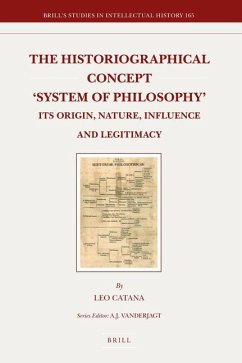Jacob Brucker (1696-1770) established the history of philosophy as a philosophical discipline in the 1740s. In order to separate this new discipline from other historical disciplines, he introduced the historiographical concept a ~system of philosophya (TM). The historian of philosophy should use this concept as a criterion of inclusion of past philosophies, and as an ideal form of exposition. The present book describes the origin of this historiographical notion, its implicit Protestant assumptions, and it traces the concepta (TM)s impact upon the methods of history of philosophy and history of ideas, as developed over the following centuries. Finally, it discusses the concepta (TM)s strenghts and weaknesses as a historiographical tool, arguing that it ought to be given up.
Bitte wählen Sie Ihr Anliegen aus.
Rechnungen
Retourenschein anfordern
Bestellstatus
Storno





